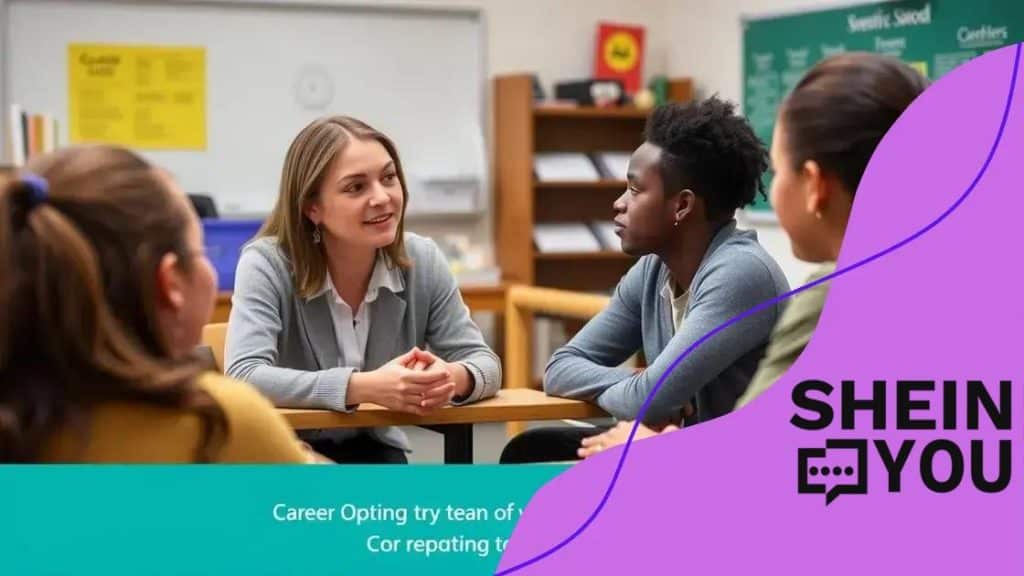The importance of career counseling in schools

Anúncios
The importance of career counseling in schools lies in its ability to guide students towards informed career choices, enhance self-awareness, and improve academic performance through tailored support and resources.
The importance of career counseling in schools goes beyond just guiding students; it shapes their futures. Have you ever wondered how these programs can influence decision-making and career choices? Let’s dive deeper.
Anúncios
Understanding career counseling’s role
Understanding career counseling’s role is essential for helping students navigate their future. When schools provide effective career counseling, they prepare students not just for jobs, but for fulfilling careers. This pivotal role encourages self-discovery, allowing students to explore their strengths and interests.
A good counselor acts as a guide, helping students connect their education with real-life career choices. Career counseling introduces students to various professions and industries, enabling them to envision their paths ahead.
The significance of career counseling
Career counseling serves several important functions:
Anúncios
- Identifying students’ interests and strengths.
- Providing information about different careers.
- Helping with educational planning.
- Offering tools for decision-making.
Once students recognize how their interests align with possible careers, they gain confidence in their choices. This alignment is crucial, as it encourages students to pursue paths that are meaningful to them.
How counselors facilitate career exploration
Effective career counselors engage students through various methods. Workshops and seminars expose students to different fields, while individual counseling sessions provide a more tailored approach. Career assessments can also help students identify suitable career options based on their unique profiles.
Furthermore, counselors often collaborate with local businesses and organizations. This partnership can lead to mentorship programs, internships, and job shadowing opportunities, providing practical experiences that enhance students’ understanding of potential careers.
Through these experiences, students not only learn about different jobs, but they also develop essential workplace skills. By recognizing the importance of career counseling, schools can create a support system that fosters student growth and success.
Benefits of early career guidance

Benefits of early career guidance in schools can make a significant difference in a student’s life. When students receive guidance early, they are better equipped to make informed decisions about their futures. This support helps them explore various career paths, leading to greater confidence in their choices.
Early interventions in career guidance can shape how students view education and their potential careers. Students who engage in this process often develop stronger goals and a clearer sense of direction. This is crucial as they transition from one educational stage to the next.
Enhancing self-awareness
One of the primary benefits of early career guidance is the enhancement of self-awareness. With the help of counselors, students can:
- Identify personal strengths and weaknesses.
- Discover interests that can shape their career choices.
- Understand how their skills align with specific job markets.
- Explore new areas that they may not have considered before.
As students learn more about themselves, they gain the confidence to pursue opportunities that genuinely interest them. This self-awareness not only helps in career planning but also contributes to improved academic performance.
Connecting education with career aspirations
Another vital benefit of early career guidance is the connection it creates between education and career aspirations. Students begin to understand the relevance of their current studies. They learn how subjects like math, science, and language arts relate to different jobs.
This connection motivates students to stay engaged in their academic work. By linking what they learn in school to future employment, students find a sense of purpose in their studies. Additionally, this insight encourages them to seek out courses and extracurricular activities that align with their career interests.
Moreover, when students receive early guidance, they are more likely to set realistic goals. They can visualize their future careers, develop action plans, and take steps towards achieving those dreams. The sooner students begin this journey, the better prepared they will be to navigate their career paths.
Ways schools can implement counseling programs
Ways schools can implement counseling programs effectively is crucial in providing students with the support they need. Schools can adopt various strategies that make career counseling more accessible and engaging.
One approach involves integrating counseling programs into the existing curriculum. By including career education in subjects like social studies or health classes, students are introduced to career planning without adding extra burden on their schedules.
Training and resources for counselors
Another essential aspect is equipping school counselors with the right training and resources. Providing ongoing professional development opportunities ensures that counselors stay updated on the latest trends in career guidance.
- Workshops focusing on emerging job markets.
- Resources for helping students explore various career paths.
- Tools for assessing student interests and abilities.
- Access to mentorship programs within the community.
By investing in counselor training, schools enhance the overall effectiveness of their programs, making it easier for students to connect with potential career opportunities. Furthermore, schools can collaborate with local businesses and community organizations.
Community partnerships
Building partnerships can create mentorship and internship opportunities that expose students to real-world experiences. Such collaborations allow students to:
- Gain insights from professionals in various fields.
- Experience hands-on activities related to their interests.
- Develop networking skills that will benefit them in the future.
- Understand the skills required for specific careers.
Additionally, schools can host career fairs, inviting local employers to share information about job opportunities and the skills needed to succeed. These events can inspire students and help them envision their future careers.
Implementing a comprehensive counseling program is not just about having counselors available; it’s about fostering an environment where students feel supported and empowered to explore their career options. When schools prioritize these strategies, they help students lay a strong foundation for their future.
Challenges in career counseling initiatives

Challenges in career counseling initiatives can hinder the effectiveness of programs designed to guide students. Understanding these challenges is essential for schools to develop better strategies.
One significant challenge is the lack of resources. Many schools face budget constraints that limit their ability to provide adequate staffing and materials for career counseling. Without enough trained counselors, students may not receive the personalized guidance they need.
Awareness of counseling programs
Another issue is the awareness of available counseling programs. Sometimes, students and their families do not fully understand the resources offered at their schools. This can lead to a lack of participation in counseling sessions and workshops.
- Promoting the benefits of career counseling.
- Making information accessible through multiple channels.
- Encouraging community involvement in career events.
By improving communication and outreach efforts, schools can increase student engagement in these valuable programs. Furthermore, cultural factors can also present challenges. Students from diverse backgrounds may have different views on careers and education.
Cultural perceptions
A counselor’s role is to understand these diverse perspectives and adapt their approach accordingly. Sometimes, cultural expectations can limit a student’s willingness to explore non-traditional career paths. It is important for counseling programs to foster an inclusive environment where all career options are welcomed and considered.
Additionally, a lack of up-to-date information can affect counseling effectiveness. The job market is continuously evolving, and it is vital for counselors to stay informed about current trends and opportunities. This knowledge will help guide students toward promising career paths.
Overall, overcoming these challenges requires collaboration between school districts, counselors, parents, and communities. By identifying the obstacles and working together, schools can create more effective career counseling initiatives that benefit every student.
Measuring the impact of counseling on students
Measuring the impact of counseling on students is essential for assessing the effectiveness of career counseling programs. Understanding these impacts helps schools improve their services and better support student needs.
Schools can evaluate the outcomes of counseling programs through various methods. One effective approach is to conduct surveys before and after counseling sessions. These surveys can assess student confidence, awareness of career options, and decision-making skills.
Tracking academic performance
Another important metric is academic performance. By comparing grades and engagement levels before and after students receive counseling, schools can see how guidance impacts educational outcomes. Increased motivation often leads to better grades and more involvement in academic activities.
- Look for improvements in GPA.
- Monitor student attendance rates.
- Use participation in extracurricular activities as a gauge.
- Assess overall student satisfaction and well-being.
Additionally, schools may benefit from analyzing post-graduation success. Tracking alumni can provide insights into how counseling shaped their career paths and choices. Understanding which students pursued higher education or entered specific fields can help refine counseling strategies.
Feedback from students and parents
Gathering feedback from both students and parents is crucial. Regular check-ins provide valuable insights into how well counseling programs meet their needs. This feedback should address whether students feel prepared for college or the workforce.
Furthermore, engaging with local businesses to assess the readiness of students can offer another layer of data. Employers can provide feedback on the skills and knowledge students bring to the job market, helping schools adjust their programs to align with industry demands.
In summary, a comprehensive approach to measuring the impact of counseling on students allows schools to adapt and enhance their programs. By utilizing diverse evaluation methods, schools can ensure that their counseling initiatives effectively support student growth and success.
FAQ – Frequently Asked Questions about Career Counseling in Schools
What is the main purpose of career counseling in schools?
The main purpose of career counseling in schools is to help students understand their interests and strengths, guiding them toward suitable career paths.
How can schools measure the effectiveness of their counseling programs?
Schools can measure effectiveness through surveys, academic performance tracking, and feedback from students and parents regarding their career readiness.
What challenges do schools face in implementing counseling programs?
Challenges include budget constraints, lack of awareness among students and parents, and varying cultural perceptions about career options.
Why is community involvement important for career counseling initiatives?
Community involvement is important as it creates partnerships with local businesses, providing students with mentorship, internships, and real-world insights into various careers.





